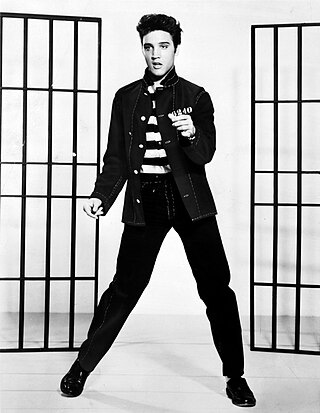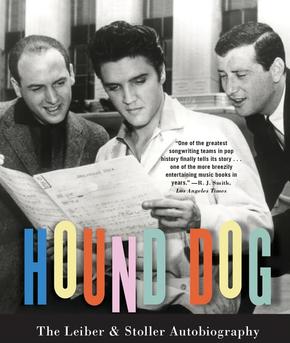Related Research Articles

Elvis Aaron Presley, often referred to mononymously as Elvis, was an American singer, actor and sergeant in the United States Army. Dubbed the "King of Rock and Roll", he is regarded as one of the most significant cultural figures of the 20th century. His energized interpretations of songs and sexually provocative performance style, combined with a singularly potent mix of influences across color lines during a transformative era in race relations, led him to both great success and initial controversy.

Atlantic Recording Corporation is an American record label founded in October 1947 by Ahmet Ertegun and Herb Abramson. Over the course of two decades, starting from the release of its first recordings in January 1948, Atlantic earned a reputation as one of the most important American labels, specializing in jazz, R&B, and soul by Aretha Franklin, Ray Charles, Wilson Pickett, Sam and Dave, Ruth Brown and Otis Redding. Its position was greatly improved by its distribution deal with Stax. In 1967, Atlantic became a wholly owned subsidiary of Warner Bros.-Seven Arts, now the Warner Music Group, and expanded into rock and pop music with releases by Crosby, Stills, Nash & Young, Led Zeppelin, and Yes.

Jailhouse Rock is a 1957 American musical drama film directed by Richard Thorpe and starring Elvis Presley, Judy Tyler, Mickey Shaughnessy, Vaughn Taylor and Jennifer Holden. Adapted by Guy Trosper from a story written by Nedrick Young, the film tells the story of Vince Everett (Presley), a convict who learns the guitar while in prison and later becomes a star following his release.

Jerome Solon Felder, known professionally as Doc Pomus, was an American blues singer and songwriter. He is best known as the co-writer of many rock and roll hits. Pomus was inducted into the Rock and Roll Hall of Fame as a non-performer in 1992, the Songwriters Hall of Fame (1992), and the Blues Hall of Fame (2012).

Bertelsmann Music Group (BMG) was a division of a German media company Bertelsmann before its completion of sale of the majority of its assets to Sony Corporation of America on 1 October 2008. Although it was established in 1987, the music company was formed as RCA/Ariola International in 1985 as a joint venture to combine the music label activities of RCA's RCA Records division and Bertelsmann's Ariola Records and its associated labels which include Arista Records. It consisted of the BMG Music Publishing company, the world's third largest music publisher and the world's largest independent music publisher and the 50% share of the joint venture with Sony Music, which established the German American Sony BMG from 2004 to 2008.

Leiber and Stoller, were an American Grammy award-winning songwriting and record production duo, consisting of lyricist Jerome Leiber and composer Michael Stoller They wrote numerous standards for Broadway.

"Hound Dog" is a twelve-bar blues song written by Jerry Leiber and Mike Stoller. Recorded originally by Big Mama Thornton on August 13, 1952, in Los Angeles and released by Peacock Records in late February 1953, "Hound Dog" was Thornton's only hit record, selling over 500,000 copies, spending 14 weeks in the R&B charts, including seven weeks at number one. Thornton's recording of "Hound Dog" is listed as one of the Rock and Roll Hall of Fame's "500 Songs That Shaped Rock and Roll", and was inducted into the Grammy Hall of Fame in February 2013.
Carlin America is an American music publisher with a catalog of over 100,000 titles. The company, created under its current name in 1995 by its founder Freddy Bienstock, is headquartered on East 38th Street in Manhattan. Bienstock died on September 29, 2009, after which Carlin Music was run by his daughter Caroline and son Robert.
Freddy Bienstock was an American music publisher who built his career in music by being the person responsible for soliciting and selecting songs for Elvis Presley's early albums and films.

"Return to Sender" is a song recorded by American singer Elvis Presley and performed in the film Girls! Girls! Girls!. The song was written by Winfield Scott and Otis Blackwell to suit Presley's rock and roll musical style. The singer laments his relationship with a spiteful partner. Released on October 2, 1962, and published by Elvis Presley Music, the song became a commercial hit and received praise for its lyricism and melody.

Elvis is the second studio album by American rock and roll singer Elvis Presley. It was released through RCA Victor on October 19, 1956 in mono. Recording sessions took place on September 1, September 2, and September 3 at Radio Recorders in Hollywood, with one track left over from the sessions for Presley's debut album at the RCA Victor recording studios on January 30 in New York. It spent four weeks at #1 on the Billboard Top Pop Albums chart that year, making Presley the first recording artist to have both albums go straight to number one in the same year. It would go on to spend 5 weeks at #1 in total. It was certified Gold on February 17, 1960, and Platinum on August 10, 2011, by the Recording Industry Association of America.

Elvis Is Back! is the fourth studio album by American rock and roll singer Elvis Presley, released on April 8, 1960 by RCA Victor. It was Presley's first album released in stereo. Recorded over two sessions in March and April, the album marked Presley's return to recording after his discharge from the U.S. Army. It was Presley's first album of new material since Elvis' Christmas Album was issued in 1957.

"How the Web Was Woven" is a song written by English songwriters Clive Westlake and David Most. It was first recorded by rock and soul singer Jackie Lomax and released in February 1970 as his final single on the Beatles' Apple record label. George Harrison produced the recording, which also features contributions from American musician Leon Russell. The single is unique in that, with Paul McCartney producing the B-side, each side was produced by a different member of the Beatles.

King Creole is the second soundtrack album by American singer and musician Elvis Presley, issued by RCA Victor, LPM 1884 in mono in September 1958, recorded in four days at Radio Recorders in Hollywood. It contains songs written and recorded expressly for the 1958 film of the same name starring Presley, and peaked at No. 2 on the Billboard Top Pop Albums chart. The album was previously released as an EP album with two volumes, King Creole Vol 1 and King Creole Vol 2. King Creole Vol 1 peaked at #1 for 30 weeks on the EP album charts. It followed the film's release by over ten weeks. It was certified Gold on July 15, 1999, by the Recording Industry Association of America.
Julian J. Aberbach was an Austrian-born music publisher, who lived and worked in both the United States and France. He was responsible, with his younger brother Jean Aberbach, for establishing the Hill and Range music publishing house, and was instrumental in the careers of many leading country and popular music performers of the mid and late twentieth century, including Elvis Presley, Johnny Cash, Ray Charles, Edith Piaf and Jacques Brel.
Joachim "Jean" Aberbach was an Austrian-born American music publisher. He was responsible, with his elder brother Julian, for establishing the Hill and Range music publishing house, and was instrumental in the careers of many leading country and popular music performers of the mid and late twentieth century, including Elvis Presley, Johnny Cash, Ray Charles, Edith Piaf and Jacques Brel.
"Got a Lot o' Livin' to Do!" is a song first recorded by Elvis Presley as part of the soundtrack for his 1957 motion picture Loving You.
"Girls Girls Girls", or "Girls! Girls! Girls!", is a song written and produced by Jerry Leiber and Mike Stoller.
"I Want to Be Free" is a song first recorded by Elvis Presley as part of the soundtrack for his 1957 motion picture Jailhouse Rock.

"Just Tell Her Jim Said Hello" is a song originally recorded by Elvis Presley with The Jordanaires written by Jerry Leiber and Mike Stoller. It reached number 55 on the Billboard Hot 100 in 1962.
References
- ↑ "Aberbach Enterprises, Limited :: New York (US) :: OpenCorporates". opencorporates.com. Retrieved 2021-11-10.
- ↑ Ronnie Pugh, Ernest Tubb: The Texas Troubadour, p.117
- 1 2 John Shepherd, Continuum Encyclopedia of Popular Music of the World, Volume 1, p.586
- ↑ Biography of Julian Aberbach by Jason Ankeny at Allmusic
- ↑ Autobiography at Julian Aberbach website Archived 2011-09-23 at the Wayback Machine
- ↑ John Broven, Record makers and breakers: voices of the independent rock 'n' roll pioneers, p.269
- ↑ "New York Dept of State public inquiry". apps.dos.ny.gov. Retrieved 2021-11-10.
- ↑ "Music Rights Management".